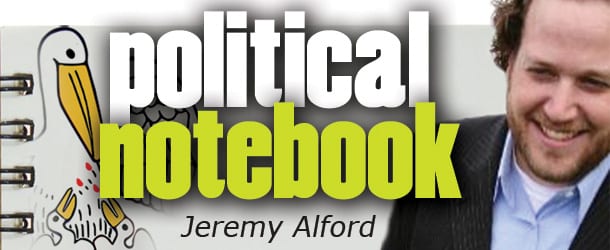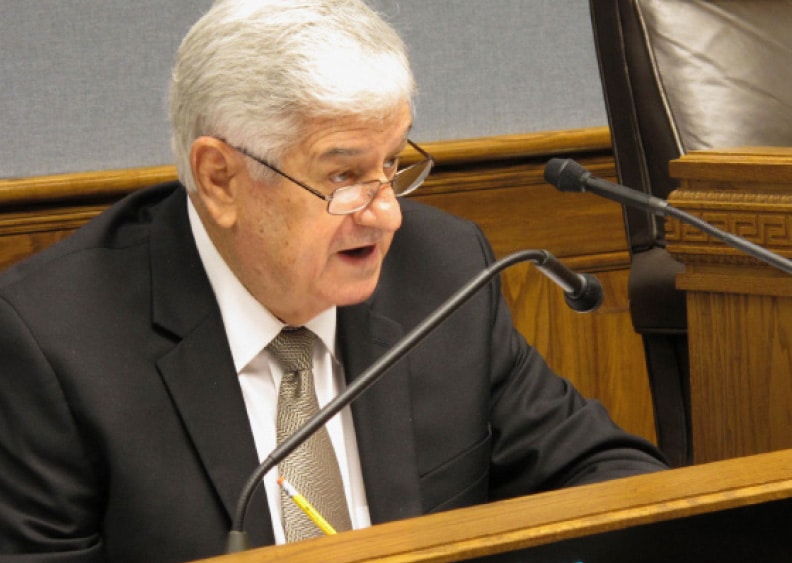By Jeremy Alford and Mitch Rabalais
The end of a legendary era has come to a close, with Senate President John Alario’s decision to not seek re-election. Alario’s tide floated many boats, and there are no doubt a few government relations professionals (and maybe gubernatorial candidates) rethinking their strategy for the next term as a result of his departure from the scene.
From a purely political perspective, this news will put to rest the rumors that Alario was going to somehow bubble to the surface for next term’s race for speaker. His absence next year will also undoubtedly help kick off a number of storylines about the next Legislature marking a transitional moment in the Capitol’s recent history.
As far as local politics, his bow increases the chances that his son, Chris, may consider a run for a justice of the peace post in Jefferson Parish.
Winning as a Republican in the Dem-Heavy HD 83, which Alario was sworn into in 1972, was going to require some work, although few thought he could lose. HD 83 had a Democratic registration of nearly 60 percent and a black population of 57 percent. Alario had previously said he intended to run as a Republican if he ran at all.
Alario’s move opens up the seat. Kyle Green, Jr., whose father served in the House, is “strongly considering” a bid. Friends say Green has already identified a few healthy sources for fundraising.
James C. Simmons, Jr., a former sheriff’s captain, and Donald Jones, a former parish councilman who has run for legislative seats in previous cycles, were both said to be eyeing the seat, even if Alario qualified. Local politicos now expect Jones to run for a parish-level position and Simmons to stick it out.
Group Launches Six-Figure Ad
The Pelican Institute for Public Policy recently launched a six-figure advertising campaign to “further educate citizens, elected leaders and candidates for office about its comprehensive policy reform effort.” The campaign is called “A Jobs and Opportunity Agenda for Louisiana.”
Since fall 2018, Pelican officials say more than $1 million in time, research and materials has gone into developing the many components comprising the agenda, which includes 202 pages of research featuring roadmaps to comprehensive, free-market reforms intended to bring jobs and opportunity to Louisiana.
The detailed platform seeks “reforms to nearly every area of Louisiana public policy, including overhauling the state’s legal system, tax code, budgeting process, criminal justice system, education system and Medicaid program, among others.”
Two major milestones for the campaign are occurring in the coming weeks — the Pelican Institute’s Constitutional Convention Forum on Aug. 20 and the organization’s citizen education efforts, which are occurring now through election day.
Political History: The Governor And The Pirate
No matter your age or at what point you became acquainted with the colorful history of the Bayou State, it is almost certain that you’ve heard the names of William C.C. Claiborne and Jean Lafitte.
In fact, you don’t have to look much further than a map. After all, Claiborne has a state building and a north Louisiana parish named after him, while Lafitte’s name can be found on a National Park and a small hamlet in Jefferson Parish.
However, despite their legendary status, the two clashed in one of the most infamous tales of political power, popularity and influence in the state’s history.
William C.C. Claiborne was a native Virginian who had become active in politics after moving to the developing new state of Tennessee. According to historian Jack McGuire in Louisiana Governors: Rulers, Rascals and Reformers, Claiborne had been an asset to Thomas Jefferson’s political campaigns and was rewarded with an appointment to Louisiana’s territorial governorship. After the Bayou State officially entered the Union in 1812, Claiborne became the first popularly elected governor.
Jean Lafitte and his brother Pierre were French-born smugglers who had brought their particular brand of business to the West Indies before settling in Louisiana in 1804. Once ensconced in the state, they set up a base of operations in Barataria Bay and began steadily raiding ships off the coast. The Lafittes would then sell whatever goods they captured at marketplaces in New Orleans, with their low overhead cost allowing them to have the cheapest prices in the city.
According to Lyle Saxon’s book, Lafitte the Pirate, the brothers’ criminal behavior was well known within New Orleans. But both the citizenry and the authorities were too busy buying their products at bargain prices to worry about the finer points of the law.
However, when an ambitious group of militia attempted to stop the Lafittes from seizing a ship, a gunfight ensued and a soldier was left wounded. Gov. Claiborne, who had already been irked by the blatant lawlessness of the pair, issued a proclamation on Nov. 13, 1813, calling for the arrest of Jean Lafitte. The governor also offered a $500 reward for whoever turned the pirate in.
The next day, Lafitte went into New Orleans for his normal business transactions and did not alter his routine despite the posters all over the city calling for his capture. “The Creoles could not but admire his indifference to danger,” Saxon wrote. “When he was seen perusing the proclamation and smiling, they were amused by his nonchalance.”
On Monday morning, New Orleanians awoke to find new proclamations all over the city next to Claiborne’s. Lafitte had virtually copied the language of his own arrest warrant, but instead offered a $1,500 reward for whoever would arrest Gov. Claiborne and bring him to Barataria.
Analysis: More Money, More Problems?
Consider, if you will, the following lead paragraph from AP reporter Melinda Deslatte: “Louisiana will close the books on the last budget year with a surplus around $300 million, the third year in a row the state has taken in more money than it immediately spent, Gov. John Bel Edwards said.”
Politically, the news is significant on two fronts. For starters, it will probably be the first task of the next Legislature to decide how to spend this loot.
Second, this will undoubtedly come back to haunt Edwards in his re-election campaign. And he already knows it, for the governor has spent considerable time trying to tell voters that surpluses are a good thing.
His opponents, on the other hand, have taken care to accuse the governor of supporting too many tax increases, which have brought in too much tax revenue.
So, in the end, how the administration counted its dollars may count for something this election cycle.
They Said It
“This is just Louisiana politics at its worst.”
— Ed Chervenak, a professor of political science at the University of New Orleans, on a KSLA-TV report that lawmakers have been spending campaign money on high-end lease vehicles
“It does not violate the spirit of the law, Number 1. The law is very, very clear. You can’t buy a car anymore, and we just lease it.”
— Sen. Greg Tarver, offering his defense, on KSLA- TV
“It’s a young man’s game. If they gave me enough money to leave, I would.”
— Don Beaulieu, who lives near the Rigolets, on dealing with coastal challenges, in the Christian Science Monitor
“It’s like the ‘Three Little Pigs’: You either build a brick house or you kill the wolf — or move away, I guess. I don’t know how we can kill the wolf, so we’ve got to build a brick house. Now, what does that brick house look like? That is the part that is playing out … Right now in front of our eyes.”
— Robert Twilley, executive director of the Louisiana Sea Grant College Program, in CSM
“How can I move — trick — somebody into buying this death house?”
— A Reserve resident, on living near “Cancer Alley,” on CBS News
For more Louisiana political news, visit www.LaPolitics.com or follow Alford and Rabalais on Twitter via @LaPoliticsNow.















Comments are closed.